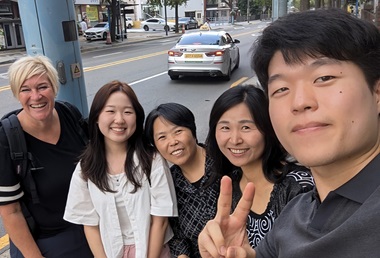
The Lausanne Congress team is already hard to work preparing for 5,000 participants.
Next week I will be in Korea, taking part in Lausanne 4, a global congress on world evangelization, September 22 – 28.
Some 5,000 Christian leaders are expected from all over the world, with thousands more participating online.
Michael Oh, Global Executive Director / CEO of the Lausanne Movement describes it as more than a gathering:
Lausanne 4 is a multi-year, global, polycentric process facilitated by the platform of Lausanne, towards catalytic collaboration of the global church, for the discipling of all nations and the shaping of the world in 2050.
The Seoul 2024 Congress marks 50 years since the first such event – after which the movement is named – took place in Lausanne, Switzerland in 1974. Two others were held in Manila (1989) and Cape Town (2010).
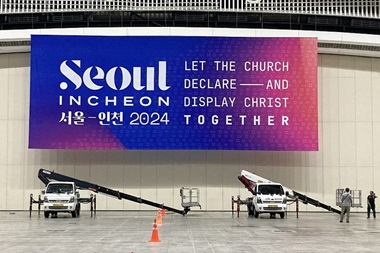 There will no doubt be celebration because of the rapid growth of the church in the Global South and fact that mission has increasingly become ‘from everywhere to everywhere’ (with pioneers from Brazil, Korea, the Philippines and Nigeria leading the way).
There will no doubt be celebration because of the rapid growth of the church in the Global South and fact that mission has increasingly become ‘from everywhere to everywhere’ (with pioneers from Brazil, Korea, the Philippines and Nigeria leading the way).
But Lausanne 4 will also provide an opportunity to grapple with new (and old) challenges – waning enthusiasm for missions in many nations, an ongoing debate over the proper balance between evangelism and social justice, and a lingering tendency for the West to retain control of the movement.
Lausanne itself has come up with 25 ‘Great Commission Gaps’ (detailed below) for delegates to wrestle with. It is a positive sign that they are recognizing weaknesses while also focusing heavily on increased international collaboration.
State of the Great Commission
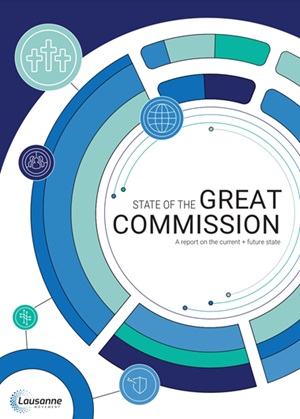 One key in preparation for Lausanne 4 is the State of the Great Commission report, which highlights positive signs and challenges to the church’s growth worldwide.
One key in preparation for Lausanne 4 is the State of the Great Commission report, which highlights positive signs and challenges to the church’s growth worldwide.
Ilana Reimer, a Vancouver writer, describes its significance in a cover story article for the September/October issue of Faith Today:
[Matthew] Niermann, a professor at California Baptist University, describes the report as an invitation for the Church to engage with the key issues of our world today.
Beginning in 2021 a research team conducted global literature surveys across every region and multiple languages. The team studied both secular and church sources to get a sense of key cultural, economic, political and theological issues.
The report is a powerful witness to the global Church community with over 150 authors – 35% from the Global West, 40% from the Global South and 25% from the Global East. It is available in English, French, Spanish, Portuguese, Russian, Mandarin and Korean (which are also the seven official languages of the congress itself).
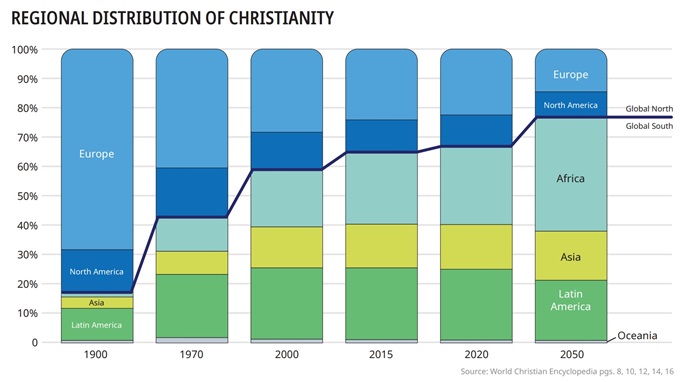
The regional distribution of Christianity has shifted dramatically toward the Global South over the past century – and that trend will continue.
The Church continues to move and change. Over the past century Christianity has grown the most in Sub-Saharan Africa and declined the most significantly in the Middle East, North Africa and Western Europe. In Europe and North America, Christian populations are aging while Sub-Saharan Africa’s youthful Christian demographic suggests the region will be increasingly central to Church growth.
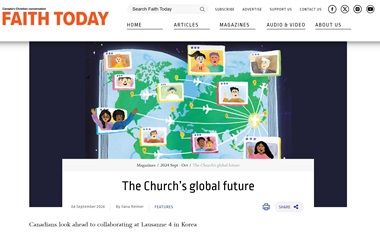 Joel Zantingh of Guelph, Ontario, director of engagement for Lausanne Canada, hopes participating in the congress will underscore for Canadian delegates the importance of listening to “the Majority World, where Christianity is growing and experiencing vitality.”
Joel Zantingh of Guelph, Ontario, director of engagement for Lausanne Canada, hopes participating in the congress will underscore for Canadian delegates the importance of listening to “the Majority World, where Christianity is growing and experiencing vitality.”
This includes listening “more diversely within our own context, centring those who have existed on the margins because they are the voices of hope and leadership for the future of the Canadian Church.”
Go here for the Faith Today article, and here to read the State of the Great Commission report.
A personal connection
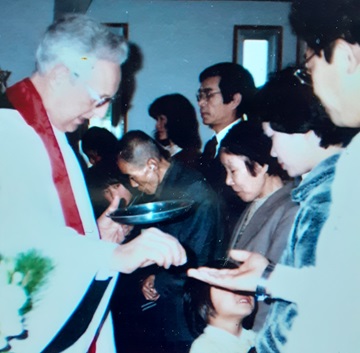
Oliver Bergh with some of his parishioners in Japan.
My father-in-law, Oliver Bergh, attended the first Lausanne Congress in 1974. He flew on a return trip from Japan, where he and his wife Judith were Lutheran missionaries for 35 years. My wife Margaret was born there.
Recently she found among her father’s papers a report he wrote about the Lausanne Congress which began:
It was a great experience to gather with people from every part of the world to consider just one thing – how we can work together so that everyone in the world can hear the Gospel in our generation:
-
- It was a chance to hear together many of the outstanding leaders of our time.
- One of the facts which we faced was that some 80 percent of the people in the world today are not able to hear the Gospel from any of their own people but will have to hear it from people who come either from another tribe or country.
- Yet there was a great spirit of optimism and reports of great movements of the Spirit of God – Indonesia, Africa and Latin America. Some things indicate that in the future the strength of the Christian church will not be in Europe and North America but in other parts of the world.
And so it has turned out.
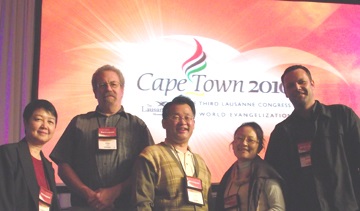
With my table group (second from left) at the Lausanne Congress in Cape Town in 2010.
My own connection with Lausanne began at a smaller gathering in Pattaya, Thailand in 2004. That opened my eyes to world missions, and I gained further insights at Lausanne 2010 in Cape Town, South Africa.
At the time I wrote:
When I landed in Cape Town the other day, I completed a round trip (of sorts) in my journey as a Christian believer. I am back on African soil for the first time since I was saved, while traveling through Zambia, in 1977.
I’ve had the opportunity to reflect on my own pilgrimage; but I’ve also developed a renewed appreciation of the simple words and acts, carried out by so many anonymous – and sometimes well recognized – people all over the world.
It is that proclamation of the gospel, accompanied by caring deeds, which led to the dramatic growth of the church in the global south (not least in Africa) over the past century. And that’s what the Lausanne Congress on World Evangelization is building on in Cape Town.
Thirty-three years ago, at 25 years of age, I hitch-hiked into Cape Town, on the southern tip of the African continent, after covering the 2,000-plus kilometres from a farm outside Lusaka, Zambia.
I arrived at the farm with some blend of New Age and Marxist beliefs, but became a Christian through the influence of the farmers with whom I stayed and worked for three months – and under the prompting of an Australian evangelist preaching in a local Baptist church. . . .
Instead of carrying on my long trip to New Zealand, I set my course to back to Europe, to L’Abri, a Christian community in Switzerland, which my Zambian hosts thought would suit a young man of many questions. Some of my questions were answered there; but I also met my wife Margaret [who had flown there from Japan], and we moved back to Vancouver.
I am very fortunate to be able to attend Lausanne 4, given that the organizers’ (very proper) aim is to have “in-person participants from every region of the world . . . 25 percent younger or emerging leaders under 40 years old, 40 percent women, and 40 percent from secular workplaces (those who do not receive their primary income from a church or ministry organization).”
Humility required
While Lausanne 4 will no doubt engender positive emotions, there will be plenty of opportunity for sober reflection as well. Following are three examples of that need.
- South Korea: mission decline
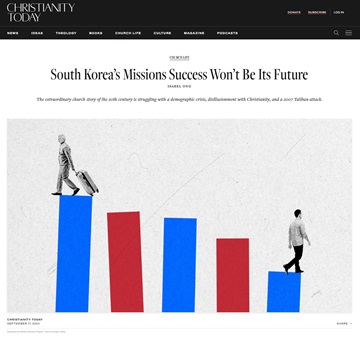 For example, while South Korea seems a natural host for the gathering, in light of its strong church growth in the 20th century and burgeoning missionary movement (they are the third largest missionary sending nation, following the United States and Brazil), times have changed.
For example, while South Korea seems a natural host for the gathering, in light of its strong church growth in the 20th century and burgeoning missionary movement (they are the third largest missionary sending nation, following the United States and Brazil), times have changed.
As Vancouver writer Isabel Ong wrote for Christianity Today September 17:
But the explosive growth of the country’s missions force does not appear to be sustainable.
“The Korean church and mission have recently plateaued due to secularization, a general disinterest in religion among young people, and the possible impact of megachurch scandals,” wrote Uchenna Anyanwu, Cristian Castro and David Ro in the Lausanne [State of the Great Commission] report. “For this reason, the Korean missionary population is gradually aging.”
Christianity has found a home in South Korea, but as in all the world, times change and the church must continue to follow the Holy Spirit in creative ways.
- Sidelining social matters?
 A new book by a secular Brazilian journalist Adriana Carranca tells the story in Soul by Soul (Columbia Global Reports, 2024) of how “US-born Protestant evangelicalism has gone global to an extent of which many of us might be unaware.”
A new book by a secular Brazilian journalist Adriana Carranca tells the story in Soul by Soul (Columbia Global Reports, 2024) of how “US-born Protestant evangelicalism has gone global to an extent of which many of us might be unaware.”
She has done an admirable job of immersing herself in the global missionary movement – something far too few secular writers are willing to do.
While she does seem to focus unduly on American influence, she makes many good points. One portion of the book addresses conflicts which arose during Lausanne 1974, and are still not fully resolved.
She writes:
In the opening evening address at Lausanne, [Billy] Graham cheered the visibility and energy of ‘younger churches’ as he stood before a multinational and racially diverse crowd. But the joyful mood didn’t last long.
Speaking on the first day, purposely in Spanish, Ecuadorian evangelist René Padilla caused a stir when he openly attacked American forms of ‘ cultural Christianity,’ which, in his view, reduced religion into a marketed product and viewed converts merely as numbers. . . .
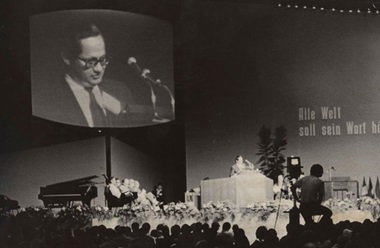
René Padilla addressing the 1974 Lausanne Congress.
The radicals of the Global South [René Padilla, Samuel Escobar, Orlando Costas and others] fought the American conservatives to add amendments to the Lausanne Covenant. The strong hand of the traditionalists showed through the final document.
Still, the radicals succeeded in some of their proposed amendments, including the covenant’s main statement: “We rejoice that a new missionary era has dawned. The dominant role of western missions is fast disappearing.
(I posted an article about Padilla’s legacy when he died in 2021.)
John Stott, who with Billy Graham paved the way to Lausanne 1974, said: “Evangelism and social action are like two wings of a bird. The church cannot fly except with both in action.”
Carranca argues that western leaders have now coopted some Latin American and other Global South leaders by shifting attention from social issues to matters such as the urgency of focusing on ‘unreached people groups’ and ‘the 10/40 Window.’
I remember John Piper making that kind of argument at Cape Town, clearly attempting to prioritize evangelism over social responsibility. We shall see what the focus is at Lausanne 4.
- Interfaith apologetics
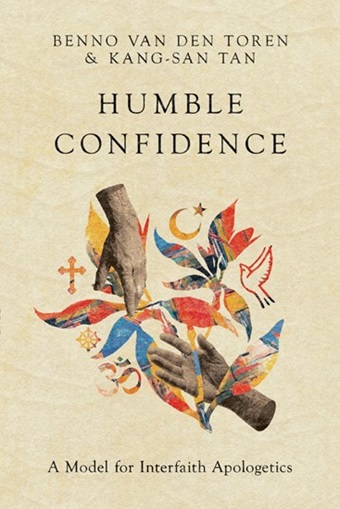 In his ‘plea and proposal for interfaith apologetics’ on the Lausanne site, Benno Van Den Toren, author (with Kang-San Tan) of Humble Confidence, wrote:
In his ‘plea and proposal for interfaith apologetics’ on the Lausanne site, Benno Van Den Toren, author (with Kang-San Tan) of Humble Confidence, wrote:
Therefore, there is a need for interfaith apologetics, but existing models of apologetics as developed in the Western world are often inadequate in multireligious contexts.
They mostly respond to questions that people may not ask: Does God exist? Is religion compatible with science?
If the questions have similarities the background to the questions may still differ. The idea that God can be known in history raises very different questions in modernity than it does for Hindus.
Other religious contexts not only raise different questions, they also present different ways of reasoning and attributing authority.
Many Western models for apologetic witness are also narrowly rationalistic. They address intellectual issues while neglecting people’s emotional lives, predispositions, and loyalties. Exploring how apologetics can become more sensitive to the realities on the ground, thus more relevant to the people in dialogue, can renew apologetic witness both in the non-Western and the Western world.
Go here for the full comment.
As much of the impetus and financial support for missions still comes from the West, it will be interesting to see how these issues are dealt with. It is encouraging to see that all have been acknowledged by Lausanne leadership.
25 Great Commission Gaps
 While there are many positive signs as one looks at the State of the Great Commission, there are also many challenges ahead.
While there are many positive signs as one looks at the State of the Great Commission, there are also many challenges ahead.
Lausanne organizers compiled a list of 25 Great Commission Gaps for delegates to consider. We are to select our top three gaps, and then to delve into them further in light of the State of the Great Commission report. This process will, apparently, inform the afternoon ‘Collaborate’ sessions at Lausanne 4.
Here are brief introductions to the 25 gaps, which are accompanied by short videos and lead to executive summaries:
- The global aging population: The global aging population (60 years and older) is rapidly increasing, expected to double from 1 billion to 2.1 billion by 2050, yet Christian missions still tend to overlook this demographic.
- The new middle class: Over the past 40 years, global efforts to alleviate poverty have increased middle-class populations, which became the majority around 2020 and are expected to grow by 2 billion by 2050, mainly in Asia.
- Reaching the next generation: Emerging generations are less open to institutional church expressions and less dedicated to Christianity, influenced by advancements in technology, changes in youth culture and a desire for holistic well-being.
- Islam: Islam has been the only major world religion to significantly grow from 1900 to today, with its global population share increasing from 12% to 25% and projected to reach 29% by 2050. This growth spans diverse con texts – from relatively open societies to countries under Shari’a law.
- Secularism: While the global population is becoming more religious, the fastest-growing affiliation is ‘none/unaffiliated.’ Strikingly, Christians represent 93% of those switching to ‘none.’
- Least reached peoples: Most Great Commission efforts focus on populations with existing gospel access, neglecting many unreached and marginalized groups. While these groups are often disconnected from traditional church structures, they are connected to various governmental, educational and medical institutions.
- A group gathered September 9 to highlight ‘Gaps in Lausanne’s 25 ‘Great Commission Gaps.’ Go here for the video on the Lausanne Movement site.Scripture in a digital age: In 2020 people averaged seven hours of screen time per day globally, a figure expected to rise. Digital technology is influencing our relationships, desires, decision making, faith formation and how we read and distribute the Bible.
- Church forms in a digital age: During Covid-19 churches and ministries shifted to online church services and digitized resources. How can these digital platforms foster reciprocal love and community rather than transactional consumerism?
- Discipleship in a digital age: What is the role of the internet in the development of wisdom and virtue? There is a need to reimagine following Jesus in a digital context, avoiding a faith where our bodies are disconnected from reality while leveraging new opportunities for global resource sharing.
- Evangelism in a digital age: Digital media offers creative ways to spread the message of Jesus, but these communications are also shaped by algorithms that suggest posts or videos based on interest, often creating siloes of like-minded people. This means social media platforms can shape users’ interests and alter the way they receive the gospel online.
- AI and transhumanism: Advancements from artificial intelligence to gene editing are reshaping what we think it means to be human. These tools can create opportunities such as enhancing Bible translation, but also offer alternative paths for hope thanks to advancements in capability and human achievement.
- Sexuality and gender: Debates about sexuality and gender are putting Christians with traditional beliefs under pressure in schools, universities and workplaces. The LGBTQ+ movement also exposes unhealthy stereotypes of femininity and masculinity, and challenges Christians to witness with grace and truth.
- Holistic health: Christian organizations experience high levels of burnout in their leaders. The call to bear witness to Christ’s love includes seeking mental, physical and spiritual health – for both those inside and outside the Church.
- Polycentric mission: Polycentric just means having key areas or hubs, each with equal importance. Christian demographics have shifted from the majority of Christians living in the Global North to the majority living in the Global South. A rebalancing of voices is needed, promoting an exchange of learning across regions.
- Polycentric resource mobilization: The shift in Christian demographics to the Global South has highlighted resource challenges for global missions, unhealthy dependencies and uneven representation of global perspective.
- Integrity and anti-corruption: Financial corruption and abuse coverups within the Church undermine the credibility of the gospel and its promise to transform character and behaviour. There is a need for churches to establish accountability structures, transparent reporting and partnerships with civil organizations if they are to restore public trust.
- Integrated spirituality in mission: Worldwide a recognizable portion of conversion growth stems from miraculous events, yet missions training can often miss this, focusing more on strategic plans. Reintegrating these two aspects of missions can strengthen churches’ competence with intercessory prayer, spiritual practices and responding to spiritual warfare.
- Developing leaders of character: Abusive, narcissistic leaders damage churches and workplaces, and hurt individuals. While these kinds of leaders can do a lot of harm, the opposite kind – those who are virtuous and humble – are a blessing to many.
- People on the move: A significant number of people are moving from their homelands, whether as migrants, refugees, international students or workers. Relocating can make it hard to form new communities and can present challenges around ethnic identity, religious expression and economic status.
- Urban communities: Over 50% of the global population now lives in urban areas – increasingly in informal settlements or slums. This trend toward urbanization within low-quality environments changes family structures and work patterns, and often means poor access to healthy communities and civil services.
- Digital communities: Online communities are a primary source of interaction for many. Despite growing groups of online friends, we’re also seeing a rise in loneliness and mental health issues.
- Ethnicism and racism: Ethnic and racial tensions are increasingly visible in society, the Church and workplaces, contrasting with the gospel’s message of unity and acceptance. These tensions hinder the Great Commission by creating barriers to disciple making and failing to recognize the gifts of all people.
- Radical politics and religious freedom: The rise in polarized and radical politics raises questions about the Church’s relationship with civil society and public freedom of religion. Amid so much division the Church’s challenge is to transcend political binaries, focusing on serving the common good.
- Caring for creation and vulnerable people: Climate change and biodiversity loss impact not only the environment, but also have the most significant toll on vulnerable populations. These two interconnected areas are both part of the Great Commission since preaching the gospel means acknowledging that Jesus is Lord of all creation and all people, and that He cares about both.
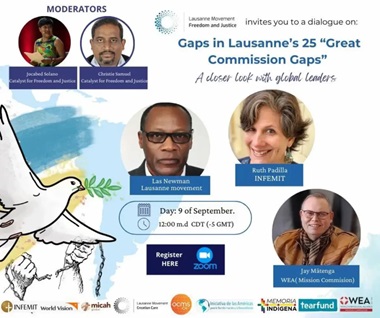 Societal trust and influence: Over 50% of global Christian leaders believe the Church has little to no influence on culture, and most say this influence is either steady or declining. This decline in influence and trust in religious institutions and leaders suggests a broader skepticism toward Christianity, requiring efforts to understand and address the factors contributing to this decline.
Societal trust and influence: Over 50% of global Christian leaders believe the Church has little to no influence on culture, and most say this influence is either steady or declining. This decline in influence and trust in religious institutions and leaders suggests a broader skepticism toward Christianity, requiring efforts to understand and address the factors contributing to this decline.
The discussion/debate has already begun. Four speakers addressed Gaps in Lausanne’s 25 ‘Great Commission Gaps, September 9 in a 53-minute video (on the Lausanne site) which deals with:
- the good things the Gaps highlight
- important areas the Gaps hide or do not address
- a few things that their local contexts could contribute to enrich the conversation about the role of the church in God’s mission in the world.
I’m looking forward to many interesting discussions and much collaborative discernment in Seoul.

I wish I was attending in person as well but the Congress VX will have to do. We’ll have to share our experiences when you return.
After reading this personal and comprehensive introduction to Lausanne 4, I would join many in both praising God and envying Flyn for this engaging opportunity!
As the world is in far more dangerous time and isms than 50 years ago, I pray Lausanne 4 will continue to humble the church into viewing social justice and concerns not as liberal distractions but as partners in the Great Commission and signposts to His Kingdom.
Much blessings, Flyn!
Wow! What a fascinating part of church history on a global scale! Terrific article with so much detail which is key in charting this organisation! And such diverse paths forward to chart new territory!
Blessings on your journey, Flyn!